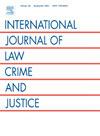关于警务决策框架:改进警务决策的建议
IF 1.4
4区 社会学
Q3 CRIMINOLOGY & PENOLOGY
International Journal of Law Crime and Justice
Pub Date : 2024-10-24
DOI:10.1016/j.ijlcj.2024.100702
引用次数: 0
摘要
本文介绍了 "警务决策框架"(DMFP),这是一个旨在提高警务人员决策理解能力的综合工具。DMFP 考虑了启发式、自然主义和理性决策等原则,沿着流畅的认知连续体创建了一个框架,以解决现有警察国家决策模型 (NDM) 的局限性。为实现这一目标,它提出了 10 种警察决策类型,包括常规决策、战术决策、行动决策、危机决策、调查决策、道德决策、人际决策、行政决策、管理决策和战略决策。这些模型与现有的和经过调整的决策模型结合在一起,并采用字母助记策略进行介绍。尽管 DMFP 是理论性的,而且与现有的 NDM 相比,其效用目前尚未得到检验,但它的提出是为了提供一种工具,通过提供易于回忆的记忆性决策模型,帮助提高官员的隐性知识、模式识别和经验学习能力。从而加深对认知过程和影响警察决策因素的理解,有可能提高推理的一致性,减少决策失误,提高警务成果。本文章由计算机程序翻译,如有差异,请以英文原文为准。
On the decision-making framework for policing: A proposal for improving police decision-making
This article introduces the Decision-Making Framework for Policing (DMFP), a comprehensive tool designed to enhance the decision-making understanding of police officers. The DMFP considers the principles of heuristic, naturalistic, and rational decision-making along a fluid cognitive continuum to create a framework that addresses the limitations of the existing police National Decision Model (NDM). It achieves this by including 10 proposed typologies of police decision-making including: Routine, Tactical, Operational, Crisis, Investigative, Ethical, Interpersonal, Administrative, Managerial, and Strategic. These are integrated alongside existing and adapted decision-making models which are presented using a mnemonic letter strategy. Although the DMFP is theoretical, and its utility is presently untested in comparison to the existing NDM, it is presented to provide a tool to help improve officers' tacit knowledge, pattern recognition, and experiential learning through provision of easily recallable mnemonic decision-models. Thereby fostering a deeper understanding of cognitive processes and the factors influencing police decisions, potentially increasing consistency in reasoning, reducing decision errors, and enhancing policing outcomes.
求助全文
通过发布文献求助,成功后即可免费获取论文全文。
去求助
来源期刊
CiteScore
2.70
自引率
0.00%
发文量
25
审稿时长
47 days
期刊介绍:
The International Journal of Law, Crime and Justice is an international and fully peer reviewed journal which welcomes high quality, theoretically informed papers on a wide range of fields linked to criminological research and analysis. It invites submissions relating to: Studies of crime and interpretations of forms and dimensions of criminality; Analyses of criminological debates and contested theoretical frameworks of criminological analysis; Research and analysis of criminal justice and penal policy and practices; Research and analysis of policing policies and policing forms and practices. We particularly welcome submissions relating to more recent and emerging areas of criminological enquiry including cyber-enabled crime, fraud-related crime, terrorism and hate crime.

 求助内容:
求助内容: 应助结果提醒方式:
应助结果提醒方式:


